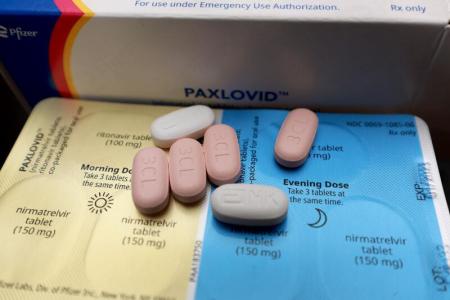How do Covid-19 antiviral pills work?
Health Minister Ong Ye Kung said on July 5 that all polyclinics and more primary care clinics here can now prescribe oral antiviral drugs to eligible Covid-19 patients.
This is to ensure that most of those infected can be treated outside of hospitals, even as coronavirus cases rise, driven by the latest Omicron subvariants BA.4 and BA.5.
Here are some answers to questions you may have about these drugs:
Q: Which oral antiviral drugs against Covid-19 do we get here?
A: Singapore's Health Sciences Authority (HSA) has authorised the emergency use of two oral treatments for Covid-19.
The first is Pfizer's Paxlovid, which is a combination of nirmatrelvir and ritonavir tablets. HSA approved it under the Pandemic Special Access Route on Jan 31.
The second one is molnupiravir, which has the brand name Lagevrio and is developed by MSD - known as Merck in the United States. HSA gave the authorisation on April 19. Both oral antivirals help to reduce the risk of hospitalisation and death.
Q: Who is eligible?
A: The oral treatments are meant for those aged 18 and above who have tested positive for Covid-19, have mild to moderate symptoms and are at high risk of becoming very sick. These include people who are immunosuppressed, have risk factors such as heart failure or diabetes, or are fighting cancer.
These tablets are available only via prescription. Treatment must be started within five days of the onset of Covid-19 symptoms - the earlier, the better.
Paxlovid is given as a course of three tablets (two tablets of nirmatrelvir and one tablet of ritonavir), to be taken twice a day for five days. For Lagevrio - or molnupiravir - you take four tablets twice a day for five days.
Q: How do these drugs work?
A: They stop the coronavirus from spreading in the body.
Paxlovid contains nirmatrelvir, which targets the 3CL-like protease, a key enzyme the coronavirus needs to replicate, and ritonavir, which helps keep nirmatrelvir active in the body for longer by inhibiting its breakdown.
Molnupiravir induces mutations in the viral RNA, stopping the virus from replicating.
Q: Which is better?
A: Both Paxlovid and Lagevrio have been shown to be effective in reducing hospitalisation and death from Covid-19, though the latter has a lower efficacy.
Lagevrio has been shown to reduce the risk of hospitalisation and death among people at risk of developing severe Covid-19 by 30 per cent. In contrast, Paxlovid has been shown to reduce the risk of hospitalisation and death in high-risk patients by nearly 88 per cent when given within five days of symptom onset.
Generally, Paxlovid is offered as the default treatment. If it is not suitable, Lagevrio may be considered as an alternative.
Dr Leong Hoe Nam, an infectious diseases physician at Rophi Clinic, said Paxlovid has been shown to be effective against coronaviruses, including variants of Sars-Cov-2, but a big worry is that it can interact with many drugs, including some cholesterol medicine, anti-depressants and the blood-thinning medication warfarin.
Paxlovid is also not suitable for those with severe kidney disease. So, those who need the drug may not be able to use it, he said.
Molnupiravir was not designed to treat Covid-19, but it can potentially attack all kinds of RNA viruses, regardless of their mutations, and does not have known drug interactions, said Dr Leong.
It is, however, not recommended for pregnant women, women who are breastfeeding, or those below 18 years of age.
"With molnupiravir, you do not have to worry about undiagnosed kidney issues or unknown drug interactions, but you have to contend with a lower efficacy," said Dr Leong. He said he prescribes oral antivirals to those who are showing symptoms and have at least one risk factor for severe Covid-19, such as a serious heart condition, chronic obstructive lung disease, obesity or cancer.
People over the age of 60 are considered to be at risk of severe disease, even if they are fully vaccinated and boosted against Covid-19, but doctors would assess their health and symptoms before prescribing the drugs.
- If you have a question, e-mail us at askst@sph.com.sg
Get The New Paper on your phone with the free TNP app. Download from the Apple App Store or Google Play Store now

